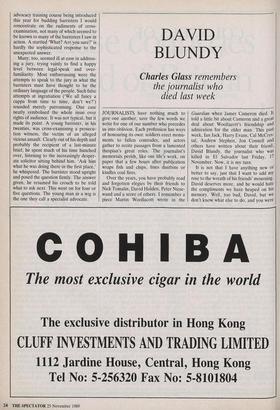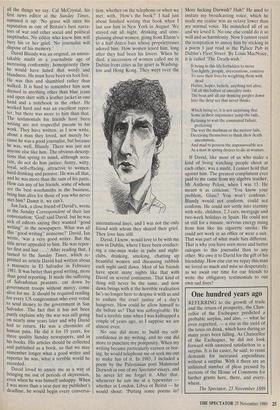DAVID B LUNDY
Charles Glass remembers
the journalist who died last week
JOURNALISTS have nothing much to give one another, save the few words we write for one of our number who precedes us into oblivion. Each profession has ways of honouring its own: soldiers erect monu- ments to fallen comrades, and actors gather to recite passages from a lamented thespian's great roles. The journalist's memorials perish, like our life's work, on paper that a few hours after publication wraps fish and chips, lines dustbins or kindles coal fires.
Over the years, you have probably read and forgotten elegies by their friends to Nick Tomalin, David Holden, Peter Niese- wand and a score of others. I remember a piece Martin Woollacott wrote in the Guardian when James Cameron died. It told a little bit about Cameron and a great deal about Woollacott's friendship and admiration for the older man. This past week, Ian Jack, Harry Evans, Cal McCrys- tal, Andrew Stephen, Jon Connell and others have written about their friend, David Blundy, the journalist who was killed in El Salvador last Friday, 17 November. Now, it is my turn.
It is not that I have anything new or better to say, just that I want to add my rose to the wreath of his friends' mourning. David deserves more, and he would hate the compliments we have heaped on his memory. Well, too bad, David, but we don't know what else to do, and you were
all the things we say. Cal McCrystal, his first news editor at the Sunday Times, summed it up: 'No grave will inter his reputation as one of Britain's best narra- tors of war and other social and political Ineptitudes. No editor who knew him will bury his or her grief. No journalist will dispose of his memory.'
David Blundy was an original, an unmis- takable misfit in a journalistic age of increasing conformity, homogeneity (how he would have hated that word) and blandness. He must have been six foot five. He was thin and shambled rather than walked. It is hard to remember him now dressed in anything other than blue jeans and open shirt with a leather jacket in one hand and a notebook in the other. He worked hard and was an excellent repor- ter, but there was more to him than that. The testimonials his friends have been writing are not respectful paeans to his work. They have written, as I now write, about a man they loved, not merely be- cause he was a good journalist, but because he was, well, Blundy. There • was just not anyone else like him. The obvious descrip- tions that spring to mind, although accu- rate, do not do him justice: funny, witty, loyal, self-effacing, attractive to women, hard-drinking and pensive. He was all that, and he was more than the sum of his parts. How can any of his friends, some of whom are the best wordsmiths in the business, bring him alive for those of you who never met him? Damn it, we can't.
Ian Jack, a close friend of David's, wrote in the Sunday Correspondent of their last conversation: 'God! said David, but he was sick of editors saying they wanted "good writing" in the newspapers. What was all this "good writing" nonsense?' David, Ian wrote, 'was a very good writer. But the title never appealed to him. He was repor- ter first and last . . .' After reading that, turned to the Sunday Times, which re- printed an article David had written about a massacre in El Salvador in February 1981. It was better than good writing, more than good reporting. It made the suffering of Salvadorian peasants, cut down by government troops without mercy, come alive for me. It should be required reading for every US congressman who ever voted to send money to the government in San Salvador. The fact that it has not been partly explains why the war was still going on nearly nine years later and why David had to return. He was a chronicler of human pain. He did it for 19 years, for three quality Sunday newspapers, and in his books. His articles should be collected and published as a book, so that we may remember longer what a good writer and reporter he was, what a terrible world he recorded.
David loved to annoy me as a way of bringing me out of periods of depression, even when he was himself unhappy. When I was more than a year past my publisher's deadline, he would begin every conversa-
tion, whether on the telephone or when we met, with, 'How's the book?' I had just about finished writing that book when I last saw him in New York in August. We stayed out all night, drinking and com- plaining about women, going from Elaine's to a half dozen bars whose proprietresses adored him. How women loved him, long after they had been his lovers. When he died, a succession of women called me in Dublin from cities as far apart as Washing- ton and Hong Kong. They wept over the international lines, and I was not the only friend with whom they shared their grief. They love him still.
David, I know, would love to be with me now in Dublin, where I have been conduct- ing a one-man wake in pubs and night- clubs, drinking, smoking, chatting up beautiful women and discussing rubbish each night until dawn. Most of his friends have spent many nights like that with David on several continents. That kind of thing will never be the same, and now dawn brings with it the horrible realisation he's no longer here to despise it with us and to endure the cruel justice of a day's hangover. How could he allow himself to die before us? That was unforgivable. He had a terrible time when I was kidnapped a couple of years ago, so I suppose we are almost even.
No one did more to build my self- confidence in my writing, and no one did more to puncture my pomposity. When my writing became particularly earnest or bor- ing, he would telephone me or seek me out to make fun of it. In 1983, I included a. poem by the Palestinian poet Mahmoud Darwish in one of my Spectator essays, and he never let me forget it. After that, whenever he saw me at a typewriter whether in London, Libya or Beirut — he would shout: 'Putting some poems in?
More fucking Darwish? Huh!' He used to imitate my broadcasting voice, which he made me realise was an octave lower than my normal voice. He mimicked all of us and we loved it. No one else could do it so well and so harmlessly. Now I cannot resist the temptation to annoy him by sticking in a poem I just read in the Palace Pub in Dublin's Fleet Street. By Louis MacNeice, it is called 'The Death-wish.'
It being in this life forbidden to move Too lightly, people, overcautious, contrive To save their lives by weighting them with dead
Habits, hopes, beliefs, anything not alive, Till all this ballast of unreality sinks The boat and all our thinking gurgles down Into'the deep sea that never thinks.
Which being so, it is not surprising that Some in their impatience jump the rails, Refusing to wait the communal failure, preferring The way the madman or the meteor fails, Deceiving themselves to think their death uncommon, And mad to possess the unpossessable sea As a man in spring desires to die in woman.
If David, like most of us who make a kind of living watching people shoot at each other, was a misfit, I cannot hold that against him. The greatest compliment ever paid to me came from my algebra teacher, Mr Anthony Pelosi, when I was 13. He meant it as criticism. 'You know your problem, Glass? You won't conform.' Blundy would not conform, could not conform. He could not settle into eternity with wife, children, 2.3 cars, mortgage and two-week holidays in Spain. He could not sit still for a minute, nervous energy rising from him like his cigarette smoke. He could not work in an office or wear a suit. That was part of what made him different. That is why you have seen more and better eulogies to this journalist than to any other. We owe it to David for the gift of his friendship. How else can we repay this man we loved so much and miss so desperately, as we await our time for our friends to write the obligatory testimonials to our own sad lives?











































































 Previous page
Previous page